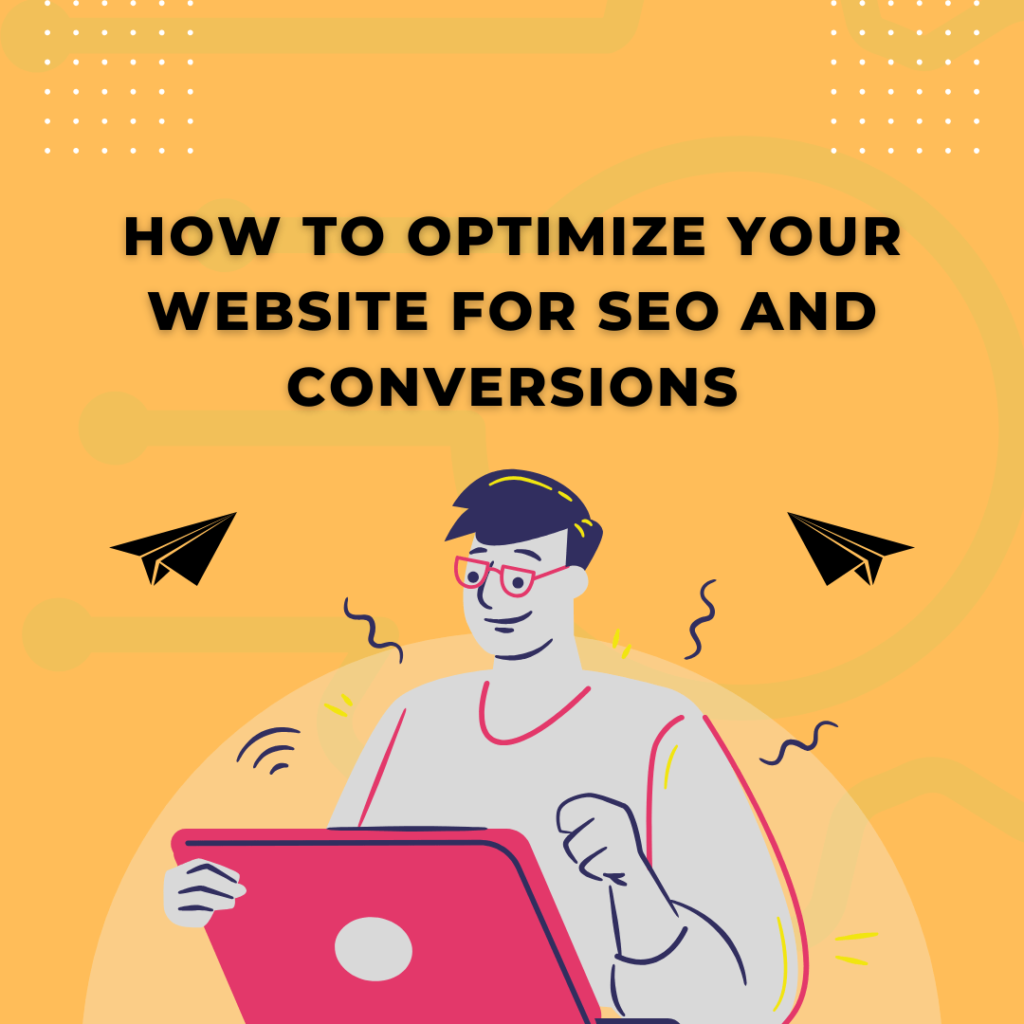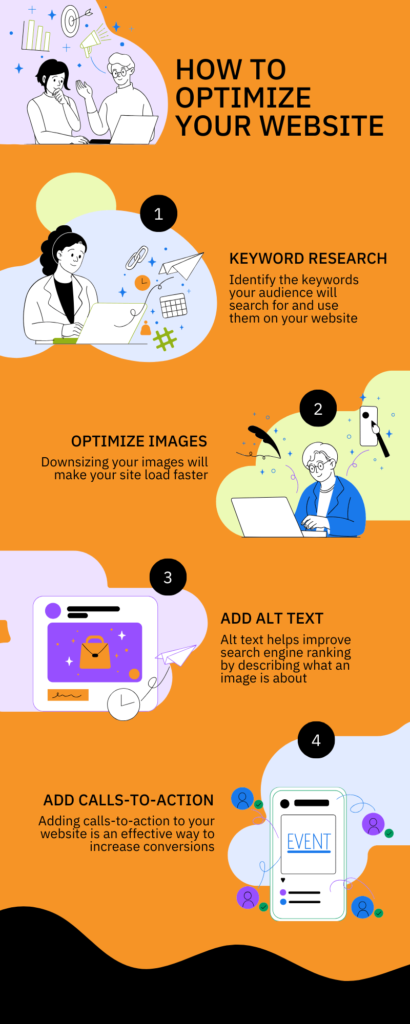
Introduction
In today’s digital age, your website is the cornerstone of your online presence. However, having a website is not enough—it needs to be optimized to rank higher in search engine results. With effective Search Engine Optimization (SEO) strategies, your website can attract more organic traffic, improve visibility, and ultimately convert visitors into customers.
In this guide, we’ll walk you through how to optimize your website for better search rankings, covering everything from technical SEO to content optimization.
1. Conduct a Comprehensive Website Audit
Before diving into optimization, it’s crucial to understand the current state of your website. A website audit identifies areas that need improvement.
Key Areas to Audit:
- Technical Issues: Broken links, slow loading pages, and mobile responsiveness.
- SEO Elements: Missing meta titles, descriptions, and alt text.
- Content Quality: Outdated or irrelevant content.
Tools to Use:
- Google Search Console: Check for indexing errors and performance metrics.
- SEMrush or Ahrefs: Identify SEO gaps and analyze your site’s health.
Action Step: Fix technical issues, update meta tags, and ensure your website is mobile-friendly.
2. Optimize On-Page Elements
On-page SEO refers to optimizing individual pages to rank higher in search results.
Best Practices for On-Page SEO:
- Use Focus Keywords Strategically: Include keywords in the title, meta description, headers, and first 100 words of the content.
- Write Compelling Meta Titles and Descriptions: These should include the target keyword and entice users to click.
- Optimize Images: Compress images to improve page speed and add alt text using relevant keywords.
- Internal Linking: Link to other pages on your site to help search engines understand your site’s structure and boost rankings.
3. Boost loading Speed to Optimize Your Website
Page speed is a critical ranking factor. A slow website not only affects rankings but also drives users away.
How to Improve Page Speed:
- Use a Content Delivery Network (CDN): Deliver content faster to users based on their location.
- Enable Browser Caching: Reduce the time it takes for returning visitors to load pages.
- Optimize Images: Use formats like WebP and tools like TinyPNG to compress images without losing quality.
- Minimize JavaScript and CSS: Combine and minify code to reduce file size.
Tip: Use tools like Google PageSpeed Insights or GTmetrix to monitor your site’s performance.
4. Focus on Mobile Optimization
With mobile-first indexing, search engines prioritize mobile-friendly websites. Ensure your site provides a seamless experience across devices.
Steps to Optimize for Mobile:
- Responsive Design: Use a design that adjusts to different screen sizes.
- Test Your Mobile Experience: Use Google’s Mobile-Friendly Test Tool.
- Simplify Navigation: Make menus and buttons easy to click on smaller screens.
Quick Win: Ensure pop-ups or interstitials on mobile do not block content, as this can negatively impact rankings.
5. Publish High-Quality, Relevant Content
Content is the backbone of SEO. High-quality content is vital to optimize your website for better search rankings and engage your audience effectively. Search engines prioritize websites that consistently publish valuable, engaging, and well-structured content.
Content Optimization Tips:
- Conduct Keyword Research: Use tools like Ubersuggest, SEMrush, or Google Keyword Planner to identify keywords your audience is searching for.
- Write for Humans First, Search Engines Second: Focus on readability and relevance while incorporating keywords naturally.
- Use Proper Formatting: Break up text with headers (H1, H2, H3), bullet points, and short paragraphs.
- Update Existing Content: Refresh old posts to keep them relevant and add new insights.
Pro Tip: Aim for content that answers specific questions, such as “how-to” guides or FAQ sections, as these perform well in search results.

6. Build High-Quality Backlinks
Backlinks (links from other websites to yours) are a significant ranking factor.犀利士 They signal to search engines that your content is trustworthy and authoritative.
Strategies to Earn Backlinks:
- Create Shareable Content: Publish infographics, original research, or case studies that others want to reference.
- Guest Posting: Write articles for reputable websites in your industry and include a link back to your site.
- Reach Out to Influencers: Ask industry leaders or bloggers to feature your content.
Avoid: Buying backlinks or using spammy link-building tactics, as these can lead to penalties.
7. Enhance User Experience (UX)
Search engines reward websites that provide a positive user experience. If visitors leave your site quickly (high bounce rate), it signals to search engines that your content may not be relevant.
How to Improve UX:
- Simplify Navigation: Make it easy for users to find what they’re looking for.
- Use Engaging Visuals: Incorporate high-quality images, videos, and infographics.
- Add Clear Calls-to-Action (CTAs): Encourage users to take specific actions, such as signing up for a newsletter or exploring more pages.
Monitor your time on site and bounce rate using Google Analytics.
If you’re launching a new business website, it’s important to also address the unique challenges of entrepreneurship. Check out our guide on How to Start a Successful Business in the UK as a Migrant for practical tips to set your venture up for success.
8. Optimize for Voice Search
With the rise of virtual assistants like Siri and Alexa, voice search optimization is becoming increasingly important.
Voice Search Optimization Tips:
- Use Conversational Keywor壯陽藥 ds: Focus on long-tail keywords and natural language phrases like “how to optimize a website for SEO.”
- Answer Questions Directly: Include an FAQ section that addresses common queries in your niche.
- Target Local SEO: Many voice searches are location-specific, so optimize for “near me” searches if relevant.
Example: If you’re a local business, include phrases like “best SEO services near me.”
9. Strengthen Local SEO (If Applicable)
For businesses targeting specific regions, Optimize your website for local search.
Local SEO Tips:
- Claim Your Google My Business Profile: Ensure your business name, address, and phone number are consistent across all listings.
- Encourage Reviews: Positive reviews improve your visibility and credibility.
- Use Local Keywords: Incorporate location-based terms like “SEO agency in London” throughout your content.
Tool to Use: Use Moz Local to check and manage local citations.
10. Monitor and Analyze Your Performance
SEO is an ongoing process. Regularly monitor your site’s performance to identify what’s working and where improvements are needed.
Tools for Monitoring:
- Google Analytics: Track traffic, bounce rate, and user behavior.
- Google Search Console: Identify indexing issues and keyword performance.
- SEMrush or Ahrefs: Monitor your rankings and backlinks.
Pro Tip: Set monthly goals and adjust your strategy based on performance metrics.
Conclusion
Optimizing your website for better search rankings is a continuous process that requires attention to detail and consistent effort. By following these steps—conducting audits, improving on-page and technical SEO, creating high-quality content, and building backlinks, you can effectively optimize your website for better search rankings and achieve long-term growth.
Optimize your site today with these actionable tips, and watch your search rankings soar!



